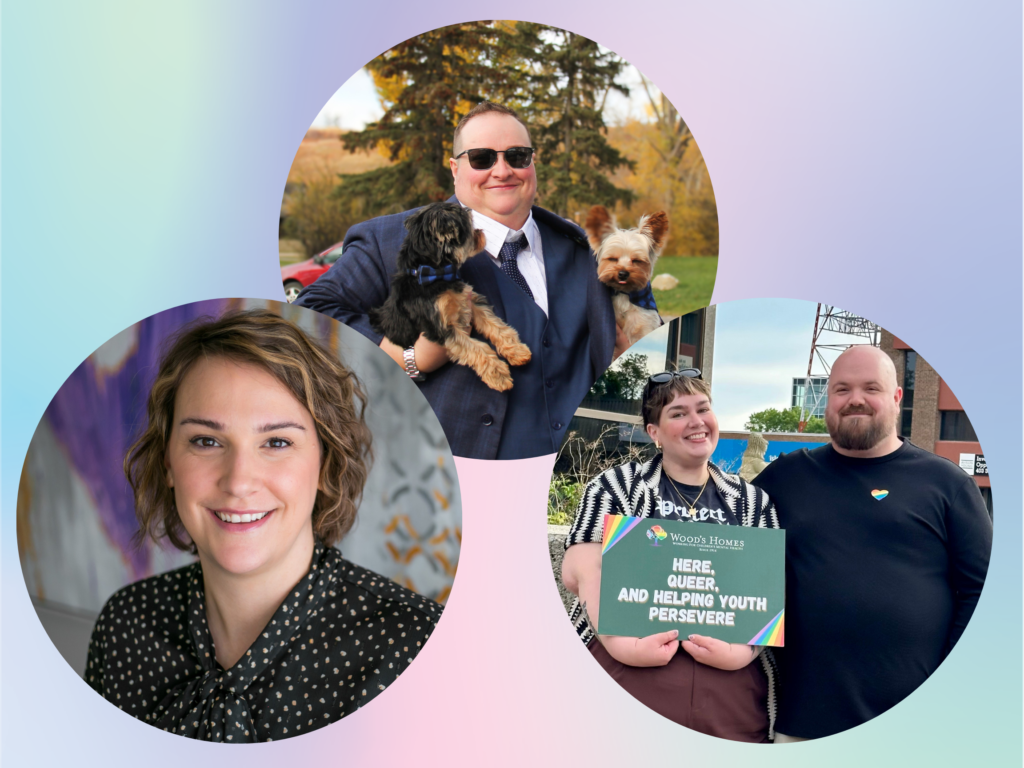Trans Day of Visibility is a day to celebrate the resilience, strength, and identity of trans, non-binary, Two-Spirit, and gender-diverse people. It’s also an opportunity to shed light on the challenges trans communities face while continuing to advocate for equal rights, acceptance, and visibility.
We spoke with Wood’s Homes staff members Stephan (he/they) and Emmy (they/them) on the importance of TDOV and their own personal journey’s and experiences as trans individuals. We also chatted with Krista West (she/her) on uplifting trans voices and supporting the trans community as an ally.
1. Why did you volunteer to be interviewed regarding TDOV? What about this day is important/relevant to you?
S: I am somewhat of an impulsive person, I’ll blame my ADHD for this, as I agreed to participate as an interviewee on impulse when the platform was provided. Since agreeing to participate I have experienced a myriad of emotions ranging from energized and giddy to regret and utter terror. When I break down why I experience the emotional rollercoaster it is due to the fear of vulnerability and putting myself out there where it is not only my professional self who is exposed but also my personal self, which is even more intimidating. It is in this reflection that I recognize why, despite my initial agreement being conducted out of impulse, I experience a sense of imperativeness to utilize a platform to speak when it is presented to me because at the end of the day is that not what Transgender Day of Visibility is about?
I do not have an overly exciting or thrilling life that anyone at any point would document, write about, or turn into a film adaptation. I exist within my professional world with ambition and intrigue, and in contrast, I exist in my personal world to be happy, content, and safe. I can appreciate that to many people, my personal goals may be interpreted as mundane and not exactly noteworthy enough to be discussed in a public post. As a trans person, being happy, content, and safe were never concepts that were represented to me as a possibility. For many years, I resisted self-acceptance due to the perception that I would be doomed to a life of turbulence, pain, rejection, self-hatred, and isolation. It is not to say that I was entirely wrong in my worries but having had years of experience of existing as a queer-trans person I have been able to build a support network to soften some of the blows. Having the opportunity to see and experience mundane life as a trans person has been a game changer for me. I am not required to fit into a mold that others prescribe to me based on their interpretation and biases of how I should or should not show up as a person. I wish I was able to state that my goal of personal safety has also been met; however, we exist in a world where it is not a reality. My safety as a person is conditional to the environment and people I am around, as well as to the policies put in place by a population of people who perceive my mere existence as threatening. Can we not see the absurdity in this? I am an average person, with an average life, who also happens to be Transgender. For all the other completely average queer-trans folx out there, I see you, you matter, I hope you experience safety, contentment, and happiness.
E: I volunteered because TDOV (Trans Day of Visibility) isn’t just about visibility—it’s about making space for conversations that matter. As a trans person, every time I share my experience, it’s an opportunity for others to see beyond stereotypes and misinformation. TDOV is important to me because it allows me to amplify my voice in a world that often forgets or dismisses the struggles of trans people. It’s not just about being seen—it’s about being heard and understood, and creating a world where everyone can live authentically and without fear.
2. What has been your experience with accessing knowledge, history, representation, and awareness of Trans people? How has this impacted you?
S: First and foremost, the amount of literature, representation, information, and overall history that is available to the public regarding gender diverse people is ASTOUNDING. I am consistently surprised when I hear people say that they have been wanting to learn and ask questions but have no idea where to start because, really, there is so much openly available information that you should quickly be able to find yourself in a rabbit hole of amazingly wondering and interesting facts, stories, cultural influences, and people. The more I lean into learning about gender identity and gender diversity the more validated I feel in my own experiences. I wish I had access to this knowledge 30 years prior, it would have saved me a great deal of turmoil. It does help that I am a sucker for a fun fact or quip about queerness and gender in all its shapes and forms as it relates to history, culture, countries, and varying day-to-day influences. I am here for it.
E: Access to knowledge on trans history and representation has often felt like searching for a needle in a haystack. It’s been tough because so much of trans history is hidden in the cracks or only told through a limited lens. But when I’ve found that knowledge, it’s been transformative. It’s like seeing a piece of myself in history that I didn’t know was there. Every time I learn more, I feel stronger and more connected to a global community of resilience. Representation is everything, and it means the world sees more of it, but I’m also driven to help create spaces where future generations can find their stories in a better light.
3. What are some experiences of navigating physical, emotional, and mental safety in your world (work, personal, education, etc.) as a trans person? Has this changed or been consistent over time?
S: Okay, so, navigating safety is brutal, plainly. I have experiences spanning from being told outright by a previous employer that as a trans person I would not be permitted to continue working at my place of employment, having a relative write a book then send it to me as a gift only to discover there is a pointed chapter overviewing their disgust and hatred of trans and queer people, relatives and colleagues holding space for transphobia with an unwillingness to explore or sit with the impacts, being dismissed when advocating for myself regarding imagery in work environments which stem from transphobic creators, etc., etc., etc. It is exhausting. Without support people, I would not have been able to navigate my way through this. Allies, you are integral, with my spouse being my greatest supporter and guide to safety. My spouse and I have had to work incredibly hard to create our own path to safety and as time has gone on it has become easier as we become more and more practiced in establishing safety within our own world.
E: Navigating safety is like playing an ongoing game of emotional dodgeball—there are days I’m hit, and days I manage to avoid the ball. I’ve definitely encountered moments where physical, emotional, and mental safety has been compromised—whether it’s microaggressions or full-on discrimination. But over time, I’ve learned how to build protective layers of self-love and community support. It’s still a journey, but now I’m more equipped to handle it with grace (and sometimes, a bit of sass). In my role as a Youth & Family Counsellor, I’m even more aware of how crucial it is to create safe spaces for the youth I work with, so they don’t have to navigate this world alone like I did.
4. What is something you wish people would STOP asking you? Is there anything you wish people would start asking instead?
S: There are primarily two things I wish people would stop asking me:
- Anything regarding Trans people being in sports
- Anything regarding how I relate to my body as a Trans person.
For the first question, if you are coming from a place of wanting to learn and contribute to a discussion then look it up yourself. I am not a beacon of knowledge in everything Trans. I acknowledge that people enjoy watching, playing, and participating in sports, but I do not. My trans-masculine identity does not give me an edge on any athlete. Let people participate in sports or whatever it is they are passionate about; you are not a martyr for speaking out against Trans athletes.
For the second question, it is astounding how many people seem to be interested in my body based on me being a Trans person. Have you taken time to reflect on how you relate to your body and how you experience every facet of your gender and physical self as it relates to someone else’s perception of how they perceive their body to then further articulate that reflection into a cohesive thought to communicate with others in a way that is palatable to their understanding of their own experiences? It is an astronomical ask of a person and I frankly do not feel you are obligated to a clear response about my body based on your own curiosity. At the end of the day, you may not have the answer you want to hear because the reality is that my relationship to my body is primarily based on being extremely sleepy, sore, and sometimes a bit gassy. Hope that helps clear up any of your questions on this topic!
For when people do have questions about my transition and my experiences I would really appreciate if people would ask if I had the capacity to hold that type of a conversation in that moment. I will likely respond with a yes because at that point I feel like people are wanting to engage with kindness, curiosity, and are able to recognize the emotional labor I experience when going into these topics. I LOVE talking about gender and queerness. If you want to engage in these topics, I am so for it, just learn how to do it respectfully.
E: When people ask, ‘So, like, what’s your real name?’ it can feel more intrusive than they might realize. I know most people don’t mean any harm, but it can be frustrating. Instead, I’d love for the conversation to focus on support and connection—questions like ‘How can I best support you?’ or ‘What do you need from me?’ feel much more meaningful and create space for real understanding.
5. Tell us more about you: What are you passionate about?
S: Alright, hear me out, I am really into wallpapering and organizing my home. I won’t get into everything I have been decorating and organizing, but let me tell you, it is an incredibly gratifying and satisfying process. 10 out of 10, would recommend.
E: I’m passionate about advocacy, mental health, and working to make sure no one feels isolated—whether it’s through the work I do at the shelter or in my free time. I’m also a sucker for good storytelling, so I love podcasts, books, and documentaries (especially anything that dives deep into queer history and mental health). When I’m not doing that, I’m probably binge-watching shows I pretend to have already seen (hello, Netflix shame), crafting weirdly amazing snack plates, or scrolling through TikTok to stay relevant (or not, depends on the day).
6. More of you: Let’s pretend the world is a safe and inclusive place, where would you like to travel to or visit? How would you travel there (cruise, hiking, flying etc.)?
S: My earliest memory of expressing a desired travel spot was when I was 8 years old in my grade 3 class when were posed the proverbial question. For nearly three decades my answer has remained the same, Germany. I have a German heritage on both sides of my family, and I have always been curious about seeing where my relatives originated from. Similar to my preference in glamping compared to camping, I would prefer to travel in style with full amenities and comfort!
E: I’d love to go to New Zealand! It’s a beautiful place with vibrant queer communities, and the landscapes are just breathtaking. I’d definitely fly there first, but once I’m there, I’d be all about hiking the mountains, wandering through the beaches, and maybe even getting lost in the forests (but, like, in a “I’m on a spiritual journey” way, not “I’m hopelessly lost and need help” way).
7. Even more of you: What are three boring/uninteresting facts about you?
S: 1. I collect decorative spoons
2. Two of my comfort foods are beans on toast and buttered egg noodles with smashed croutons mixed in.
3. I have a pair of Crocs that I always wear when I am walking around my home.
E: 1. I’m one of the lucky few who have the genetic mutation that makes cilantro taste like soap. It’s like the universe decided I didn’t need to enjoy salsa the way other people do—and I’m learning to live with it.
2. I have a genetic predisposition for being way too good at remembering every detail about a random conversation from five years ago. I’d call it a superpower, but it’s usually just awkward for everyone involved.
3. I have an almost supernatural ability to remember obscure policy details at work but will forget where I set down my coffee in under five seconds.
8. Is there anything else you want to talk about or share?
S: Not particularly, maybe on an alternative impulse interview I will share more. Thanks for giving my thoughts a read and a platform to speak! Give yourself grace, be kind to yourself and others, you are valid.
E: I think we all need to keep pushing for more community-based care, especially for marginalized folks. It’s about creating spaces where people can show up as their full, messy, authentic selves and be accepted without question. The work I do at the shelter is all about that, and I’m so passionate about empowering the youth to realize that they’re not alone in their struggles. We’ve got a long way to go, but every step counts. And hey, if we can do it with some humor along the way, it’s even better.
The following interview is with Krista West, Senior Director of Program & Associate at Wood’s Homes:
1. Why did you volunteer to be interviewed regarding TDOV? What about this day is important/relevant to you?
As a leader at Wood’s Homes, it’s not enough for me to be passive – I need to use my voice for change. Creating space for visibility as a way to interrupt the stereotypes and shift biases is something I can do. My hope is that this will shine a light on trans excellence, impact, and value in our communities.
3. Which Trans and Queer role models have inspired or impacted you on your journey, and how have they made a difference?
The stories of activists like Marsha P. Johnson and Sylvia Rivera were key in the Stonewall uprising and their stories resonate deeply with me. Those women got knocked down, disparaged, and harmed – yet their voices did not quiet. It’s admirable, and a story of resistance that needs to get told over and over again. We (I) need to empower and create space for the next generation of trans activists whose voices need to be lifted up.
4. How, as a trans Ally, do you carry weight to support people within the Trans community?
At times in my role at Wood’s Homes, I have decision-making power and the ability to influence processes at work. As these opportunities present themselves – I take them! Over time, I have shone the light on the need for policies and procedures that support trans employees, such as clear anti-discrimination policies, safe spaces, and gender-affirming workplace practices.
5. What biases have you addressed to become a better ally, what work are you doing to continue to address your biases and not be a performative ally?
I am firmly rooted in the position of learner where I constantly challenge my own biases and understanding, following, and learning from my trans friends, trans activists and community leaders. I flex my allyship muscles by naming and calling out transphobia, and try to push back against misinformation whenever the opportunity arises. When I get it wrong – which I do sometimes – I slooooow down, check in with myself, re-organize my learning, and apologize.




